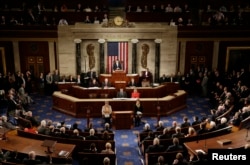The U.S. House of Representatives has just a few days to finish negotiations for a 2017 budget. If no agreement is reached on levels of funding, the U.S. government will shut down at midnight April 28.
What is the US House of Representatives?
Each of the House's 435 representatives represents about 700,000 people back in their home state Congressional districts. They draft and pass legislation that will become the law of the land. The House is half of the legislative branch of government. Together with the other half, the Senate, it makes up the U.S. Congress.
Why are they debating the budget?
The government budget is one of the most important pieces of legislation the House debates.
It is a law directing how the U.S. government spends its money. Just like any other legislation the House passes, the budget must be passed by the Senate and signed by the president to become a law.
Why are they making a decision so close to the deadline?
Late last year President-elect Donald Trump asked the Republican Congress to delay consideration of the 2017 budget so his new administration could make decisions on funding priorities.
Congressional Republican leaders agreed and passed a continuing resolution (CR) to fund the government while they discussed those priorities. They gave themselves a deadline of April 28 to complete those priorities, that is when the money appropriated for government spending runs out.
Are these debates and compromises unusual?
Not recently. The U.S. government has started each of the last eight fiscal years under a CR.
Does it matter if it’s a continuing resolution or a budget?
A continuing resolution keeps all spending at current levels. A budget allows for cuts or increases that can have a great deal of impact on how government agencies operate.
Republicans have a majority in the U.S. Congress and a President in the White House. Why can’t they agree on a budget?
Congressional Republicans don’t always agree on spending priorities with President Trump, who has often diverged from his party on many key issues.
Like any political party, the Republican Party encompasses many different approaches to social and economic issues. For example, the House Freedom Caucus believes in limited government and more power for the states. The “Tuesday group” is made up of Republicans who consider themselves moderates on spending and how involved the government should get in people’s personal lives.
Different groups in a party align or break away from each other depending on the issue being debated. A bill must have 218 votes to pass the House.
If House Speaker Paul Ryan cannot accumulate enough votes from his own party to pass a bill, he will have to negotiate to win votes from the Democrats, the minority party.
How much money is in the federal budget?
Total spending in the 2017 budget is about $3.65 trillion. Trump proposed increases in spending for the Departments of Defense and Homeland Security and suggested paying for some of these increases through cuts to other government agencies.
What are the obstacles to funding the government?
The president’s budget is only a suggestion to Congress. As representatives of the people of the United States, Congress members are charged with making the final funding decisions. One of those obstacles could be Trump’s request to fund building a wall along the U.S.-Mexico border.
Will Congress give President Trump money for the wall?
Many House representatives have concerns about the cost of a border wall. Cost estimates vary, from the Department of Homeland Security’s $21 billion to a Senate Democrats’ report putting the cost at almost $70 billion.
House representatives have questioned if a border wall is the best use of government money and proposed funding other options, such as increased personnel, technology and surveillance.
If time is running out to fund the government, they could compromise on these options and save the fight for border wall funding for next year’s budget.
Why is the timing of this budget fight important?
Trump’s 100th day in office will be on April 29. Many observers and presidents see the first 100 days as an important milestone for measuring legislative and foreign policy achievements, but it has no official significance.
Building a wall on the US-Mexico border was one of Trump’s signature campaign promises. Securing funding for the border wall in the 2017 budget would be a high-profile accomplishment during his early days in office.
But Trump may want to avoid a government shutdown starting on his 100th day in office.
What’s next?
Congress will have to start looking at a budget for 2018 very soon. Because they have more time to work on the 2018 budget, expect to see big battles over some of Trump’s key policy proposals, including cutting funding to government agencies, increasing defense spending, and immigration enforcement.









